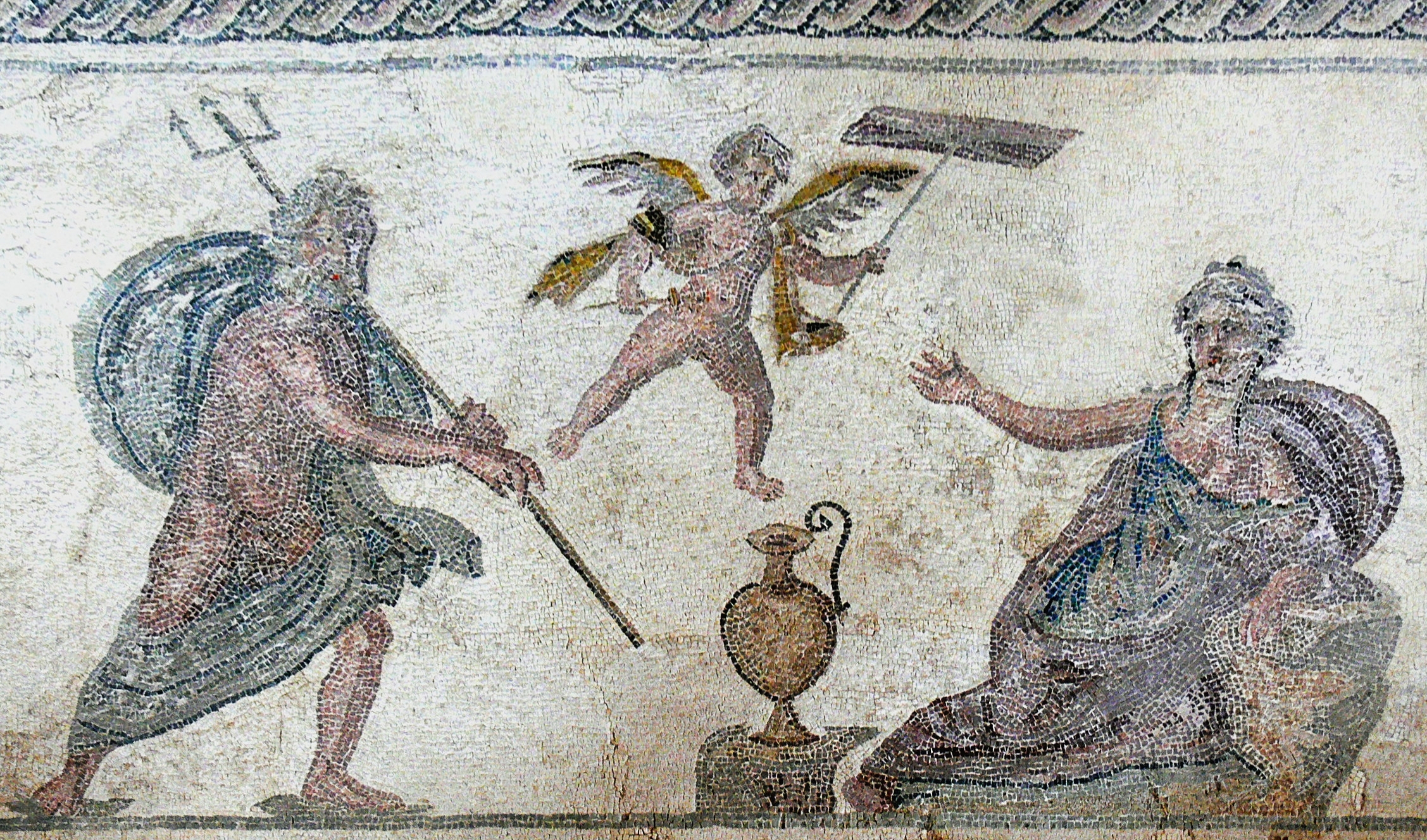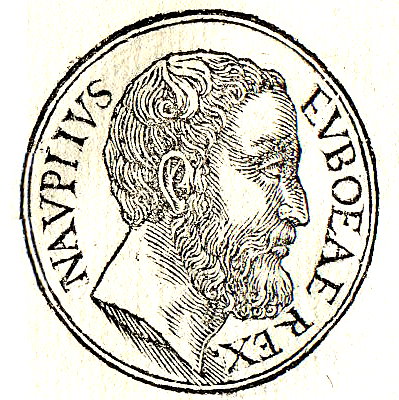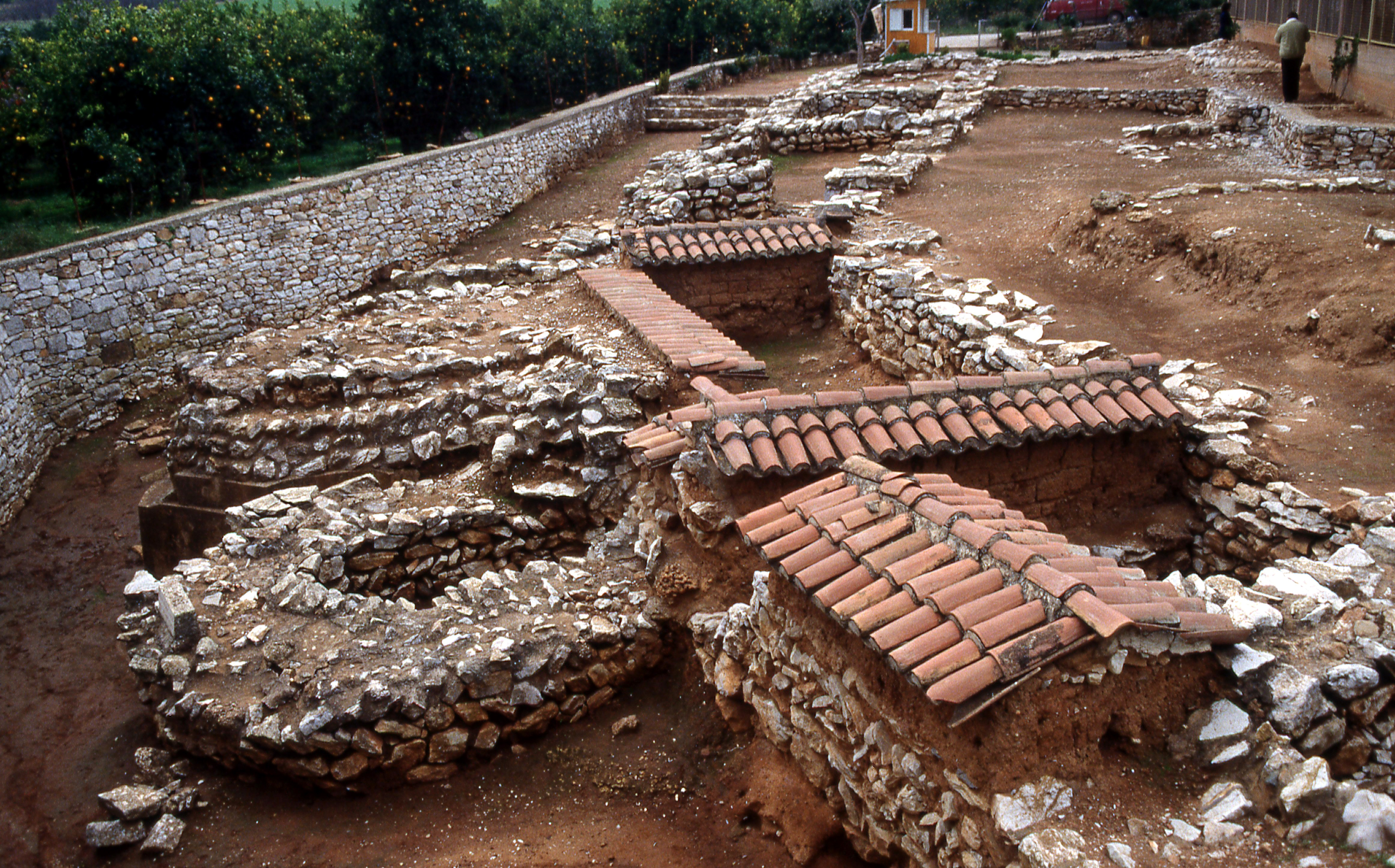|
Amymone
In Greek mythology, Amymone (;Ancient Greek: Αμυμωνη means the "blameless" one) was a daughter of Danaus, king of Libya and Europe, a queen. As the "blameless" Danaid, her name identifies her as, perhaps, identical to Hypermnestra ("great wooing" or "high marriage"), also the one Danaid who did not assassinate her Egyptian husband on their wedding night, as her 49 sisters did. (See the myth at the entry for Danaus.) The author of the '' Bibliotheca'', in his list of names for the Danaids, does mention both Hypermnestra and Amymone, however (''Library'' 2.1.5). Mythology Poseidon had dried up all the region' of Argos' springs after the Argolid was awarded to the protection of Hera. It would appear from the myth that Poseidon preceded Hera in the heartland of her cult. But he rescued Amymone from a chthonic satyr that was about to rape her. To possess her himself, the god revealed the springs of Lerna, a cult site of great antiquity near the shores of the Argolid. To Pos ... [...More Info...] [...Related Items...] OR: [Wikipedia] [Google] [Baidu] |
Satyr
In Greek mythology, a satyr ( grc-gre, σάτυρος, sátyros, ), also known as a silenus or ''silenos'' ( grc-gre, σειληνός ), is a male nature spirit with ears and a tail resembling those of a horse, as well as a permanent, exaggerated erection. Early artistic representations sometimes include horse-like legs, but, by the sixth century BC, they were more often represented with human legs. Comically hideous, they have mane-like hair, bestial faces, and snub noses and are always shown naked. Satyrs were characterized by their ribaldry and were known as lovers of wine, music, dancing, and women. They were companions of the god Dionysus and were believed to inhabit remote locales, such as woodlands, mountains, and pastures. They often attempted to seduce or rape nymphs and mortal women alike, usually with little success. They are sometimes shown masturbating or engaging in bestiality. In classical Athens, satyrs made up the chorus in a genre of play known as a ... [...More Info...] [...Related Items...] OR: [Wikipedia] [Google] [Baidu] |
Nauplius (mythology)
In Greek mythology, Nauplius ( grc, Ναύπλιος, "Seafarer") is the name of one (or more) mariner heroes. Whether these should be considered to be the same person, or two or possibly three distinct persons, is not entirely clear. The most famous Nauplius, was the father of Palamedes, called Nauplius the Wrecker, because he caused the Greek fleet, sailing home from the Trojan War, to shipwreck, in revenge for the unjust killing of Palamedes. This Nauplius was also involved in the stories of Aerope, the mother of Agamemnon and Menelaus, and Auge, the mother of Telephus. The mythographer Apollodorus says he was the same as the Nauplius who was the son of Poseidon and Amymone. Nauplius was also the name of one of the Argonauts, and although Apollonius of Rhodes made the Argonaut a direct descendant of the son of Poseidon, the Roman mythographer Hyginus makes them the same person. However, no surviving ancient source identifies the Argonaut with the father of Palamedes. Son of Po ... [...More Info...] [...Related Items...] OR: [Wikipedia] [Google] [Baidu] |
Poseidon
Poseidon (; grc-gre, Ποσειδῶν) was one of the Twelve Olympians in ancient Greek religion and myth, god of the sea, storms, earthquakes and horses.Burkert 1985pp. 136–139 In pre-Olympian Bronze Age Greece, he was venerated as a chief deity at Pylos and Thebes. He also had the cult title "earth shaker". In the myths of isolated Arcadia he is related with Demeter and Persephone and he was venerated as a horse, however, it seems that he was originally a god of the waters.Seneca quaest. Nat. VI 6 :Nilsson Vol I p.450 He is often regarded as the tamer or father of horses, and with a strike of his trident, he created springs which are related to the word horse.Nilsson Vol I p.450 His Roman equivalent is Neptune. Poseidon was the protector of seafarers, and of many Hellenic cities and colonies. Homer and Hesiod suggest that Poseidon became lord of the sea when, following the overthrow of his father Cronus, the world was divided by lot among Cronus' three sons ... [...More Info...] [...Related Items...] OR: [Wikipedia] [Google] [Baidu] |
The Suppliants (Aeschylus)
''The Suppliants'' ( grc, Ἱκέτιδες, ''Hiketides''; Latin: ''Supplices''), also called ''The Suppliant Maidens'', ''The Suppliant Women'', or ''Supplices'' is a play by Aeschylus. It was probably first performed "only a few years previous to the ''Oresteia'', which was brought out 458 BC." It seems to be the first play in a tetralogy, sometimes referred to as the ''Danaid Tetralogy'', which probably included the lost plays ''The Egyptians'' (also called ''Aigyptioi''), and ''The Daughters of Danaus'' (also called ''The Danaïdes'' or ''The Danaids''), and the satyr play ''Amymone''. The 1952 publication of Oxyrhynchus Papyrus 2256 fr. 3 confirmed the existence of a trilogy, probably produced in 463. See Garvie 163-97, Friis Johansen/Whittle 1.23-25 and Sommerstein 141-52 for discussions of the trilogy's date, constituent plays and a hypothetical reconstruction of the plot. It was long thought to be the earliest surviving play by Aeschylus due to the relatively anachroni ... [...More Info...] [...Related Items...] OR: [Wikipedia] [Google] [Baidu] |
Aeschylus
Aeschylus (, ; grc-gre, Αἰσχύλος ; c. 525/524 – c. 456/455 BC) was an ancient Greek tragedian, and is often described as the father of tragedy. Academic knowledge of the genre begins with his work, and understanding of earlier Greek tragedy is largely based on inferences made from reading his surviving plays. According to Aristotle, he expanded the number of characters in the theatre and allowed conflict among them. Formerly, characters interacted only with the chorus.The remnant of a commemorative inscription, dated to the 3rd century BC, lists four, possibly eight, dramatic poets (probably including Choerilus, Phrynichus, and Pratinas) who had won tragic victories at the Dionysia before Aeschylus had. Thespis was traditionally regarded the inventor of tragedy. According to another tradition, tragedy was established in Athens in the late 530s BC, but that may simply reflect an absence of records. Major innovations in dramatic form, credited to Aeschylus by Aristotle ... [...More Info...] [...Related Items...] OR: [Wikipedia] [Google] [Baidu] |
Danaus
In Greek mythology, Danaus (, ; grc, Δαναός ''Danaós'') was the king of Libya. His myth is a foundation legend of Argos, one of the foremost Mycenaean cities of the Peloponnesus. In Homer's ''Iliad'', "Danaans" ("tribe of Danaus") and "Argives" commonly designate the Greek forces opposed to the Trojans. Family Parents and siblings Danaus, was the son of King Belus of Egypt and the naiad Achiroe, daughter of the river god Nilus, or of Sida, eponym of Sidon. He was the twin brother of Aegyptus, king of Egypt while Euripides adds two others, Cepheus, King of Ethiopia and Phineus, betrothed of Andromeda. Danaides Danaus had fifty daughters, the Danaides, twelve of whom were born to the naiad Polyxo; six to Pieria; two to Elephantis; four to Queen Europa; ten to the hamadryad nymphs Atlanteia and Phoebe; seven to an Ethiopian woman; three to Memphis; two to Herse and lastly four to Crino. According to Hippostratus, Danaus had all these progeny begotten b ... [...More Info...] [...Related Items...] OR: [Wikipedia] [Google] [Baidu] |
Europa (Greek Myth)
In Greek mythology, Europa ( /jʊəˈroʊpə, jə-/; Ancient Greek: Εὐρώπη ''Eurṓpē'', Attic Greek pronunciation: u̯.rɔ̌ː.pɛː or Europe is the name of the following figures: * Europa, one of the 3,000 Oceanids, water-nymph daughters of the Titans Oceanus and his sister-spouse Tethys. In some accounts, her mother was called Parthenope and her sister was Thraike. Europa was the mother of Dodonaeus ( Dodon) by Zeus. *Europa, second wife of Phoroneus and mother of Niobe. * Europa, a Phoenician princess from whom the name of the continent Europe was taken. She was the lover of Zeus. * Europe, a queen in her country and one of the many consorts of Danaus, king of Libya. She conceived four of the Danaïdes namely: Amymone, Automate, Agave and Scaea. These women wed and slayed their cousin-husbands, sons of King Aegyptus of Egypt and Argyphia during their wedding night.Apollodorus2.1.5/ref> According to Hippostratus, Europe was the daughter of the river- ... [...More Info...] [...Related Items...] OR: [Wikipedia] [Google] [Baidu] |
Lerna
In classical Greece, Lerna ( el, Λέρνη) was a region of springs and a former lake near the east coast of the Peloponnesus, south of Ancient Argos, Argos. Even though much of the area is marshy, Lerna is located on a geographically narrow point between mountains and the sea, along an ancient route from the Argolid to the southern Peloponnese; this location may have resulted in the importance of the settlement. Its site near the village Myloi, Argolis, Mili at the Argolic Gulf is most famous as the lair of the Lernaean Hydra, the chthonic many-headed water snake, a creature of great antiquity when Heracles killed it, as the second of his Heracles#Labours of Heracles, labors. The strong Karst topography, Karstic springs remained; the lake, diminished to a silt lagoon by the 19th century, has vanished. Lerna is notable for several archaeological sites, including an Early Bronze Age structure known as House of the Tiles, dating to the Helladic period, Early Helladic period II (25 ... [...More Info...] [...Related Items...] OR: [Wikipedia] [Google] [Baidu] |
Lynceus
In Greek mythology, Lynceus (; grc, Λυγκεύς, Lynkeús, lynx-eyed) was a king of Argos, succeeding Danaus on the throne. Family Lynceus was named as a descendant of Belus through his father Aegyptus, who was the twin brother of Danaus, father of fifty daughters called Danaïdes. He had forty-nine siblings and out of them had five full brothers namely Proteus, Busiris, Enceladus Lycus and Daiphron through their mother Argyphia, a woman of royal blood. By Hypermnestra, Lynceus became the father of Abas, who succeeded him as king. Mythology Lynceus's father Aegyptus commanded that his sons should marry the Danaïdes but Danaus together with his daughters fled to Argos where King Pelasgus ruled. Then Lynceus together with his brothers and father arrived to take the Danaïdes. Danaus gave them to spare the Argives the pain of a battle. However, he instructed his daughters to kill their husbands on their wedding night. Forty-nine followed through, but one, Hypermne ... [...More Info...] [...Related Items...] OR: [Wikipedia] [Google] [Baidu] |
Tartarus
In Greek mythology, Tartarus (; grc, , }) is the deep abyss that is used as a dungeon of torment and suffering for the wicked and as the prison for the Titans. Tartarus is the place where, according to Plato's ''Gorgias'' (), souls are judged after death and where the wicked received divine punishment. Tartarus is also considered to be a primordial force or deity alongside entities such as the Earth, Night, and Time. Greek Mythology In Greek mythology, Tartarus is both a deity and a place in the underworld. In ancient Orphic sources and in the mystery schools, Tartarus is also the unbounded first-existing entity from which the light and the cosmos are born. As a deity In the Greek poet Hesiod's ''Theogony'' ( late 8th century BC), Tartarus was the third of the primordial deities, following after Chaos and Gaia (Earth), and preceding Eros, and was the father, by Gaia, of the monster Typhon. According to Hyginus, Tartarus was the offspring of Aether and Gaia. ... [...More Info...] [...Related Items...] OR: [Wikipedia] [Google] [Baidu] |
Libyan Characters In Greek Mythology
Demographics of Libya is the demography of Libya, specifically covering population density, ethnicity, education level, health of the populace, economic status, and religious affiliations, as well as other aspects of the Libyan population. The Libyan population resides in the country of Libya, a territory located on the Mediterranean coast of North Africa, to the west of and adjacent to Egypt. Libyans live in Tripoli. It is the capital of the country and first in terms of urban population, as well as Benghazi, Libya's second largest city. History Historically Berber, over the centuries, Libya has been occupied by the Phoenicians, Greeks, Romans, Arabs, and Italians. The Phoenicians had a big impact on Libya. Many of the coastal towns and cities of Libya were founded by the Phoenicians as trade outposts within the southern Mediterranean coast in order to facilitate the Phoenician business activities in the area. Starting in the 8th century BC, Libya was under the rule of ... [...More Info...] [...Related Items...] OR: [Wikipedia] [Google] [Baidu] |
Mortal Parents Of Demigods In Classical Mythology
*
{{disambiguation ...
Mortal means susceptible to death; the opposite of immortal. Mortal may also refer to: * Mortal (band), a Christian industrial band * The Mortal, Sakurai Atsushi's project band * ''Mortal'' (novel), a science fiction fantasy novel by Ted Dekker and Tosca Lee * ''Mortals'' (novel), a 2003 novel by Norman Rush * ''Mortal'' (film), a 2020 adventure film * "Mortal" (''Smallville''), an episode of the television series ''Smallville'' See also * ''Mortal Kombat'', a fighting game series * ''Mortal Online'', a 2010 video game by Star Vault * Mortality (other) Mortality is the state of being mortal, or susceptible to death; the opposite of immortality. Mortality may also refer to: * Fish mortality, a parameter used in fisheries population dynamics to account for the loss of fish in a fish stock thr ... [...More Info...] [...Related Items...] OR: [Wikipedia] [Google] [Baidu] |

.jpg)






